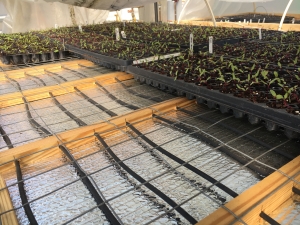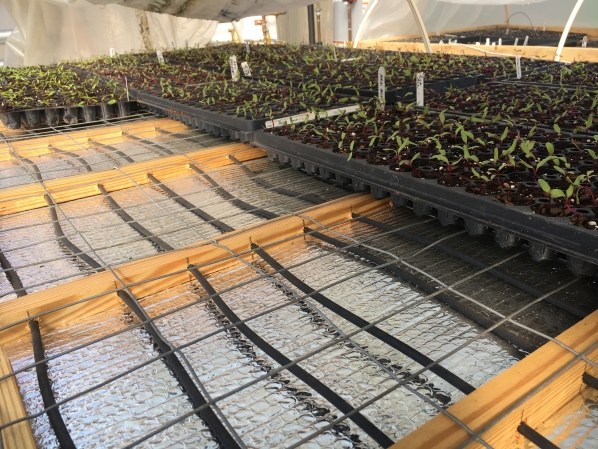Dr. Ok-Youn Yu, associate professor and assistant chair in Appalachian State University’s Department of Sustainable Technology and the Built Environment, has developed new tools to help farmers save on energy costs while extending their growing season. Yu, who is the principal researcher on Appalachian’s Nexus project, spent spring 2018 piloting his root zone heat distribution system at two local farms. One of those, Springhouse Farm in Vilas, realized an energy savings of more than 50 percent in its greenhouse operation from January through May.
Nexus is multidisciplinary team of faculty and students working to develop inexpensive, efficient and renewable greenhouse heating technologies that provide an affordable and sustainable means to improve the food-growing capacities of local farmers while reducing the use of fossil fuels. In January, the team installed the root zone heat distribution system in a conventional greenhouse at Springhouse, and in a passive solar vertical greenhouse at Against the Grain Farm in Zionville. The pilot system works by using energy produced from a biochar kiln and solar collector to heat water, which is then pumped through small tubes installed underneath the benches where crops are planted.
“The root zone heating system, as opposed to a space heating system, is much more efficient,” stated Yu. “It generally allows operators to set their nighttime greenhouse temperatures five or 10 degrees lower, which results in an overall energy savings.”
Yu and his team of faculty and students will monitor the pilot systems through 2020 as part of their current grant through the U.S. Department of Agriculture. In the meantime, they are educating local farmers about the benefits of root zone heating.
“We can conduct a feasibility study on each farm and design and install a root zone heat distribution system based on individual needs,” he said. “All of this is free to the farmers through our grant.”
In addition to his work with root zone heating, Yu recently received a grant from the North Carolina Department of Agriculture and Consumer Services to design a system for Heritage Homestead Goat Dairy in Crumpler that will improve soil quality and increase crop yield by managing goat waste through a combination of biochar and anaerobic digestion. His team is also in the process of writing a grant that will allow them to build their own anaerobic digestion system once the design is complete.
“For us, it’s about community,” said Yu. “Our goal is to enhance access to fresh produce and support local farmers while developing sustainable growing techniques.”
About the Department of Sustainable Technology and the Built Environment
One of seven departments housed in the College of Fine and Applied Arts, the Department of Sustainable Technology and the Built Environmentat Appalachian State University features an integrated array of programs spanning the fields of sustainable design and technology. Its mission is to foster a strong and vibrant culture of inquiry, discovery and innovation that integrates theory with application, problem seeking with problem-solving, local issues with global perspectives and technological progress with environmental stewardship. It offers bachelor’s degrees in sustainable technology and building science, and a master’s degree in technology.
About Appalachian State University
Appalachian State University, in North Carolina’s Blue Ridge Mountains, prepares students to lead purposeful lives as global citizens who understand and engage their responsibilities in creating a sustainable future for all. The transformational Appalachian experience promotes a spirit of inclusion that brings people together in inspiring ways to acquire and create knowledge, to grow holistically, to act with passion and determination, and embrace diversity and difference. As one of 17 campuses in the University of North Carolina system, Appalachian enrolls about 19,000 students, has a low student-to-faculty ratio and offers more than 150 undergraduate and graduate majors.

